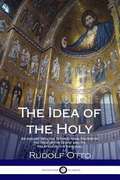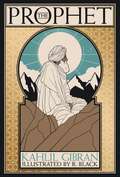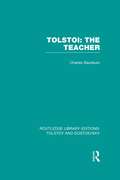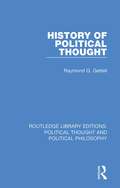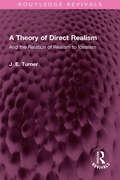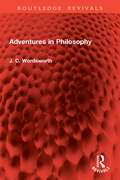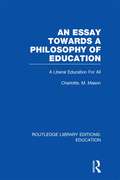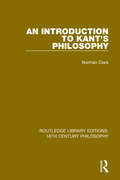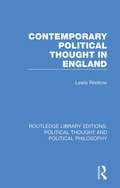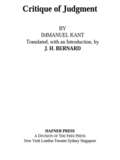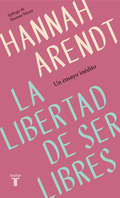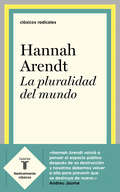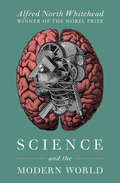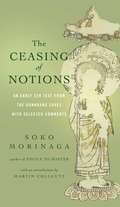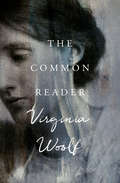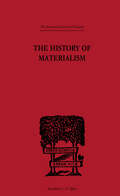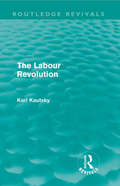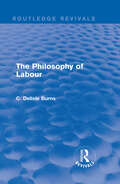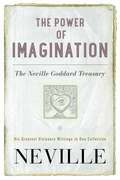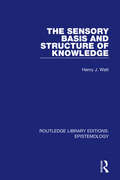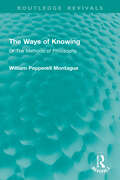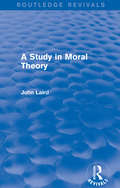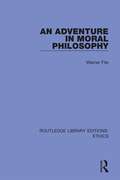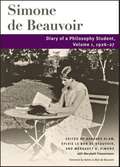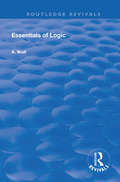- Table View
- List View
The Idea of the Holy: An Inquiry into the Non-Rational Factor in the Idea of the Divine and Its Relation to the Rational
by John Harvey Rudolf OttoRudolf Otto's classic The Idea of the Holy brims with deep theological and philosophical insights into the theory of religion and spiritual belief in God. As both a theologian and a philosopher, Otto was fascinated by how the rational and non-rational interact and interplay with regard to humanity's religious beliefs. This investigation determines that valid, non-rational experiences are as poignant in the development of knowledge - yet how do we quantify and apportion value to various rational arguments for faith, and the experiences so many believers have had over the millennia? <p> The author delves into these arguments, and valiantly attempts to determine how the divine interacts with various emotions. He coins the term 'numinous' from the root word 'numen', to denote an emotional state of consciousness apt to receive spiritual insight. The many emotions and attuning of the soul to God falls under the designation, and it proved to be one of the most important ideas Otto would ever advance. <p> The Idea of the Holy remains an important text for students of both philosophy and religion, as well as spiritually inclined readers. Although Christian believers will profit from its concepts and deep discussion of spiritual matters, those of a different faith or of none often come to respect the intricacy and depth with which Otto explains and qualifies his theology in rational and non-rational terms. This edition contains the text of the original first translation to English of 1923 by John W. Harvey, who strived to preserve the clarity, concision and poise of Otto's lessons. Since the book was originally published in German in 1918, it has been translated into over twenty different languages.
The Prophet: Deluxe Illustrated Edition
by Kahlil GibranA special and deluxe illustrated edition of the inspirational, million-copy bestselling classic. The perfect gift for anyone journeying and questioning on the road of life.Few books can be described as universal. And yet, The Prophet, by Lebanese-American author Kahlil Gibran, can only be described as that. Originally published in 1923, The Prophet is considered Gibran's masterpiece and is one of the most beloved spiritual classics of all time. Further cementing its status as a worldwide classic is the fact that it has been translated into over 100 different languages, making it one of the most translated books in history. Drawn from Gibran's own experience as an immigrant, The Prophet transcends generations, languages, and borders.In this beautiful meditation on the meaning of life, Al Mustafa, the prophet, is about to board a ship back to his homeland after 12 years spent living in exile in the city of Orphalese. Before he departs, he is stopped by a group of followers who ask him to share his wisdom. In twenty-six poetic essays, Al Mustafa offers profound and timeless insights on various aspects of life and the myriad impulses of the human heart and mind. He offers lessons on love, marriage, children, pain, friendship, beauty, religion, joy, knowledge, reason and passion, time, good and evil, pleasure, and death.A timeless spiritual touchstone, this gorgeously illustrated gift edition is perfect for graduating students, or for anyone searching for solace, peace, hope, and purpose in today's world.
Tolstoi: The Teacher (Routledge Library Editions: Tolstoy and Dostoevsky)
by Charles-BaudouinThe author states here that Tolstoy was a great educator and his views on education were ingenious and profound. Despite being a great artist, Tolstoy also had pedagogic method and drew abundantly on the stores of science. The book looks at articles which Tolstoy wrote on education and childhood, comparing him frequently to Rousseau, and also outlines the influences of his travels which informed his knowledge of contemporary schooling. The conclusion considers the development of Tolstoy’s thought on teaching alongside the state of education at the time the book was first published, in 1923. This will be of interest for the educational historian as well as those interested in Tolstoy himself.
History of Political Thought (Routledge Library Editions: Political Thought and Political Philosophy #25)
by Raymond G. GettellFirst published in 1924. This extensive volume explores the history of political theory from Ancient Greece up until proletarian thought in the early twentieth century. The author pays particular attention to the connection between economic and political theory during the eighteenth and nineteenth centuries. History of Political Thought will be of great interest to students of history, politics, and philosophy.
A Theory of Direct Realism: And the Relation of Realism to Idealism (Routledge Revivals)
by J. E. TurnerFirst published in 1925, A Theory of Direct Realism is divided in two parts: the first part is an attempt to formulate a realistic theory of Perception and of the physical world, and the second part is an exposition of Hegelian idealism and its compatibility with realism. This book on direct realism will be of interest to students of philosophy, history and literature.
Adventures in Philosophy (Routledge Revivals)
by J. C. WordsworthFirst published in 1925, Adventures in Philosophy presents a series of essays dealing with some of the chief problems of metaphysics and beginning with a defence of that somewhat unpopular pursuit. The first part of the book is mainly constructive in character, and not only attempts to put as clearly as possible the metaphysical views of the author but indicates their consequences from an ethical standpoint. The later chapters discuss two of the most important developments in philosophy associated with the names of Einstein and Bergson. Finally, the author considers how far religion, especially the Christian religion, is affected by the conclusions reached earlier in the book. This is an important historical reference for students and scholars of philosophy.
An Essay Towards A Philosophy of Education: A Liberal Education for All (Routledge Library Editions: Education)
by Charlotte M MasonThis was the last and most important and comprehensive work of Charlotte Mason, (founder of the Parents’ National Educational Union). For more than half a century the practical results of her original thought on education could be seen in all parts of the world in the Charlotte Mason Method and the Parents’ Union Schools.
An Introduction to Kant's Philosophy (Routledge Library Editions: 18th Century Philosophy #8)
by Norman ClarkEmmanuel Kant has the distinction of having introduced a great revolution into philosophy and yet stood the test of time. He stands as one of the great foundation stones of modern thought. This book, first published in 1925, covers Kant’s works essential to his philosophy as a system, and also illustrates his position in the history of thought. It is a clear and accurate statement of Kant’s chief doctrines.
Contemporary Political Thought in England (Routledge Library Editions: Political Thought and Political Philosophy #50)
by Lewis RockowFirst published in 1925. This book is a brief analysis of the historical relation of contemporary writers to their immediate predecessors. The author attempts to further a comprehensive summary of certain selected writers, with a criticism of their ideas, while in the last chapter an attempt is made at synthesis. Among those whose work is examined are Ramsay MacDonald, Bertrand Russell, Harold Laski, the Pauls, Hobhouse, Bryce, G. D. H. Cole, Norman Angell, etc. This title will be of great interest to students of politics, philosophy and history.
Critique of Judgement
by Immanuel Kant J. H. BernardA refreshing approach to the study of major Western philosophers. Introductory essays by noted scholars enliven each volume with insights into the human side of the great thinkers, and provide authoritative discussions of the historical background, evolution, and importance of their ideas. Highly recommended as stimulating classroom texts.
La libertad de ser libres
by Hannah Arendt«Leer a Hannah Arendt permite comprender mejor el presente.» Berliner Morgenpost ¿Qué es la libertad y qué significa para nosotros? ¿Consiste solo en la ausencia de miedo y restricciones, o acaso implica también la participación en procesos sociales, con voz política propia, ser escuchado, reconocido y finalmente recordado por otros? Publicado en Estados Unidos en los años sesenta pero inédito hasta hoy en español -y en alemán-, este ensayo refleja el rigor y la fuerza del pensamiento político de Hannah Arendt y condensa con precisión y maestría sus reflexiones sobre la libertad, de gran calado y capaces de conectar de manera asombrosa con los desafíos y peligros de nuestro tiempo. Arendt rastrea el desarrollo histórico de la noción de libertad, en particular, toma en cuenta las revoluciones en Francia y América. Mientras que la primera supuso un punto de inflexión en la historia pero terminó en desastre, la otra fue un éxito triunfal pero se mantuvo como un asunto local. Repensar la idea de revolución se ha vuelto imperioso hoy, y este reencuentro con Hannah Arendt representa el impulso necesario para las nuevas generaciones. La crítica ha dicho:«Este ensayo recién redescubierto es como una petición de compromiso político en la era de Trump.»Die Zeit «Pese a haber sido escrito hace cincuenta años, es tan moderno que parece pensado para la actualidad política mundial.»Westdeutscher Rundfunk «Breve y revelador. Escrito hace más de cincuenta años, es de una vigencia pasmosa.»Deutschlandfunk Kultur «Una pieza muy atractiva y perdida por largo tiempo.»Süddeutsche Zeitung «Este texto tiene futuro hoy.»Frankfurter Rundschau «Un texto muy sugerente, que además es perfecto para los recién llegados a Arendt.»Zeitzeichen «Un ensayo inspirador de una relevancia extraordinaria, especialmente en tiempos en que se cuestionan los valores liberales del orden democrático.»Philosophie «Lo que parece un análisis preciso de la fallida construcción de la nación por medios militares, desde Somalia hasta Irak y Afganistán, en realidad tiene cinco décadas de antigüedad.»Westdeutsche Allgemeine Zeitung «Vale la pena leerlo por la claridad de su razonamiento, por ejemplo a la hora de fijar el concepto de "revolución" y reflejar su cambio histórico de significado.»Badische Neueste Nachrichten
La pluralidad del mundo
by Hannah ArendtLa obra de Hannah Arendt sintetizada en esta antología esencial e imprescindible. No hay nada más radical que un clásico. Hannah Arendt, la gran pensadora del siglo XX, es sin duda fundamental para afrontar los desafíos del XXI. Abordó todas las cuestiones clave de su tiempo, desde el antisemitismo hasta el totalitarismo, los orígenes de la democracia, la crisis de la autoridad, los fundamentos de la educación y la estética o el problema del mal en la modernidad. Toda su obra está sintetizada en esta antología esencial e imprescindible. ------------- radical: adj. Perteneciente o relativo a la raíz. «Clásicos Radicales» nace con la misión de recuperar algunos de los libros más emblemáticos del sello que en su día formularon una idea nueva u ofrecieron una mirada original y pertinente sobre las grandes cuestiones universales.Ausentes de las librerías durante demasiado tiempo pero recordados y buscados por los lectores más despiertos, estos textos esenciales de disciplinas como la filosofía, la ética, la historia, la sociología, la economía, la antropología, la psicología y la política mantienen su plena vigencia y vuelven hoy con fuerza para iluminar nuestro presente. ------------- Reseña:«Hannah Arendt volvió a pensar el espacio público después de su destrucción y nosotros debemos volver a ella para prevenir que se destruya de nuevo.»Andreu Jaume
Science and the Modern World: Lowell Lectures, 1925
by Alfred North WhiteheadThe famed mathematician and philosopher takes readers on a journey into a new scientific age, exploring topics from relativity to religion. Alfred North Whitehead, one of the great figures in the philosophy of science, wrote this prescient work nearly a century ago. Yet, in an era that has us reckoning with science and technology&’s place and meaning in our lives, it remains as relevant as ever. Science and the Modern World puts scientific discovery into historical and cultural context—exploring the effects of science and people on each other. &“It is a work not only of the first importance but also of great beauty. . . . Vivid writing.&” —Nature
The Ceasing of Notions
by Soko Morinaga Venerable Myokyo-Ni Martin Collcutt Michelle BromleyAmong the writings from the Dunhuang Caves, discovered in the mid-twentieth Century, are the Zen equivalent of the Dead Sea Scrolls--ancient texts unknown for centuries. The Ceasing of Notions is one such text. It takes a unique form: a dialogue between two imaginary figures, a master and his disciple, in which the disciple tenaciously pursues the master's pity utterances with follow-up questions that propel the dialogue toward ever more profound insights. And these questions prove to be the reader's very own. Soko Morinaga brings alive this compact and brilliant text with his own vivid commentary. This volume also includes a generous selection from Morinaga's acclaimed autobiography, Novice to Master: An Ongoing Lesson in the Extent of my Own Stupidity.
The Common Reader: First Series, Annotated Edition (The Common Reader #1)
by Virginia WoolfA collection of essays from the acclaimed author of Mrs. Dalloway on such subjects as Jane Austen, Geoffrey Chaucer, and her own literary philosophy. A good essay must have this permanent quality about it; it must draw its curtain round us, but it must be a curtain that shuts us in not out. Not written for scholars or critics, these essays are a collection of Virginia Woolf&’s everyday thoughts about literature and the world—and the art of reading for pleasure. That many of them previously appeared in such publications as the Nation, Vogue, and the Yale Review points to their widespread appeal. Still, her brilliant powers of observation and insatiable curiosity shine through . . . &“After all, Mrs. Woolf is no common reader, try as she may to be one. Her powers of coordination and logical inference are altogether too strong and capable. No common reader would kick the over-praised Robinson Crusoe overboard to float in seas of adolescent adoration for Moll Flanders, as she does. It would take an uncommon common reader to discourse as pithily on Elizabethan drama or the furiously literary Duchess of Newcastle. No idle peruser of the printed page would meditate so beautifully on Greek letters. And when we come to those essays, &‘Modern Fiction&’ and &‘How It Strikes a Contemporary,&’ a note that is altogether professional and the result of intensive study and theorizing is to be discerned.&” —The New York Times &“Woolf&’s provocative collection of essays, reviews and flights of literary imagination assesses both the famous and the obscure.&” —The Times (London)
The History of Materialism: And Criticism Of Its Present Importance (classic Reprint) (International Library of Philosophy)
by F.A. LangeThis is Volume I of five in a series on Epistemology and Metaphysics. Originally published in 1865, this book offers the history of materialism and a criticism of its present importance in that period of time, presented in three parts.
The Labour Revolution (Routledge Revivals)
by Karl KautskyFirst published in English in 1924 this ambitious work, by the famous Marxist theoretician Karl Kautsky, aims to provide nothing less than an "exposition of the methods to introduce socialism" amongst the capitalist economies of Europe in the post-World War One era. Looking back on the experiences of the German socialist movement and looking forwards to the likelihood of a Labour government in Great Britain, he discusses the problems facing a labour revolution in Europe, with particular reference to the role of the middle classes, the transitional period between capitalism and socialism, and the economic impact of a socialist revolution.
The Philosophy of Labour (Routledge Revivals)
by C. Delisle BurnsOriginally published in 1925, C. Delisle Burns’ The Philosophy of Labour attempts to lay down key aspects of labour and the working class of that time period, covering aspects such as economic obstacles, standards of living and patriotism. Burns does not draw on past philosophers or sociological thinkers of the working-class and instead chose to focus only on the attitude of the workers in factories, mines, roads, railways and other forms of manual labour. This title will be of interest to students of philosophy.
The Power of Imagination
by NevilleAn anthology of the greatest writings of modern mystic, Neville Goddard, who has enthralled a new generation of readers with his simple but radical principle that your imagination is God. This broad-ranging anthology assembles the greatest works of Neville Goddard, who, writing under the sole name Neville, became one of the most quietly seismic spiritual philosophers of the modern age.From the late 1930s until his death in 1972, Neville promulgated one basic, extraordinary idea, which he restated with freshness and verve in more than ten books and hundreds of lectures: The human imagination is the Jesus Christ of Scripture, and the world around you is the out-picturing of your emotionalized thoughts.Here is an unparalleled journey into the ideas and methods of a profoundly practical spiritual thinker whose vision of life can challenge your concept of what it means to be human.This volume features a rare personal portrait of Neville by journalist and philosopher Israel Regardie.Includes these classic works:Introduction: Neville: A Portrait by Israel Regardie (1947)Your Faith Is Your Fortune (1941)Freedom for All: A Practical Application of the Bible (1942)Feeling is the Secret (1944)Prayer: The Art of Believing (1945)The Search (1946)Out of this World: Thinking Fourth-Dimensionally (1949)The Power of Awareness (1952)Awakened Imagination (1954)Seedtime and Harvest: A Mystical View of the Scriptures (1956)The Law and the Promise (1961)
The Sensory Basis and Structure of Knowledge (Routledge Library Editions: Epistemology)
by Henry J. WattOriginally published in 1925. If we are to know what intelligence is, how the brain can think, and what place mind holds in the scheme of things, we must first have a science of the sensory basis and structure of knowledge. This book supplies that need; it also serves as a short introduction to the systematic psychology of cognition.
The Ways of Knowing: Or The Methods of Philosophy (Routledge Revivals)
by William Pepperell MontagueThe Ways of Knowing (1925) examines the ways of attaining knowledge and verifying it, looking at the six methods of logic. It is also concerned with the epistemological problem of interpreting the relation of truth to the mind.
A Study in Moral Theory (Routledge Revivals)
by John LairdFirst published in 1926, this study addresses the theory of morality using four overarching approaches: analytical, psychological, theoretical, and finally, philosophical. Within these methodologies, chapters explore such areas as the character of moral enquiry, the knowledge of good and evil, freedom and self-determination and moral philosophy. This is an interesting reissue, which will be of particular value to students researching the philosophy of ethics and morality.
An Adventure In Moral Philosophy
by Warner FiteOriginally published in 1926, this book develops the Socratic thesis that morality is intelligence, that morality is not a matter of standards, laws and principles but in knowing what we do – in living self-consciously. The book develops this central theme in its bearings upon logic and science, art and religion and suggests that both intelligence and morality stand for much more than appears first obvious.
Diary of a Philosophy Student: Volume 1, 1926-27
by Simone De Beauvoir Sylvie Le Beauvoir Margaret A. Simons Marybeth Timmermann Barbara KlawRevelatory insights into the early life and thought of the preeminent French feminist philosopher Dating from her years as a philosophy student at the Sorbonne, this is the 1926-27 diary of the teenager who would become the famous French philosopher, author, and feminist, Simone de Beauvoir. Written years before her first meeting with Jean-Paul Sartre, these diaries reveal previously unknown details about her life and offer critical insights into her early philosophy and literary works. Presented here for the first time in translation and fully annotated, the diary is completed by essays from Barbara Klaw and Margaret A. Simons that address its philosophical, historical and literary significance. The volume represents an invaluable resource for tracing the development of Beauvoir's independent thinking and influence on the world.
Essentials of Logic (Routledge Revivals)
by A. WolfOriginally published in 1926, this book is an exploration of the essentials of logic: the study of the general conditions of valid inference. The main aim of logic is not to teach people to reason correctly, but to explain what happens when they do reason correctly, and why some reasoning is not correct, and this book contains chapters examining judgment and terms; categorical propositions and their implications; and deduction and syllogism.
